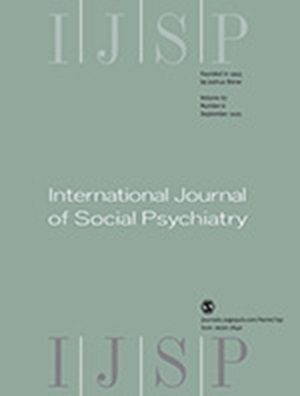对重新安置在马萨诸塞州的乌克兰难民进行社会和情绪健康干预,以减轻他们的压力、焦虑和抑郁。
IF 2.5
4区 医学
Q2 PSYCHIATRY
引用次数: 0
摘要
背景:难民因逃离战争、目睹暴力和冲突造成的灾难和死亡而饱受创伤,因此心理健康问题在他们中间很普遍。难民在抵达东道国之前、期间和之后的迁徙过程中会面临各种社会文化压力,这可能会增加他们出现心理健康问题的风险。以优势为基础的干预措施可以通过加强个人的优势来解决他们的问题,从而有利于应对他们的社会文化和心理压力。目的本研究评估了社会和情感幸福干预对马萨诸塞州乌克兰难民心理健康(压力、焦虑和抑郁)和情感健康结果(应对、自我效能、社会支持和冲突解决)的影响。方法我们对 31 名乌克兰难民实施了干预(每周一次/5 周),并对心理和情感健康结果进行了前后评估(2022-2023 年)。干预包括 5 个模块:管理压力和身心锻炼、加强沟通和社交网络、解决问题和创造健康的家庭环境。采用经过验证的量表来测量心理和情绪健康结果,如霍普金斯症状量表-25(用于测量焦虑和抑郁)和科恩压力量表(用于测量压力)。结果干预前后焦虑(61.29% 对 22.58%)和抑郁(58.06% 对 22.58%)的比例有所下降。从干预前到干预后,压力的平均得分明显下降了 6.26 分,焦虑下降了 7.07 分,抑郁下降了 6.29 分(P 均小于 0.01)。干预后,乌克兰人的压力、焦虑和抑郁有所减轻,应对、自我效能和社会支持网络技能有所提高。该计划应在更大的社区推广,以扩大受益面。本文章由计算机程序翻译,如有差异,请以英文原文为准。
Social and emotional well-being intervention to reduce stress, anxiety, and depression among Ukrainian refugees resettled in Massachusetts.
BACKGROUND
Mental health problems are high among refugees due to their traumatic experiences of fleeing war and witnessing disasters and deaths due to violence and conflict. Refugees are exposed to various socio-cultural stressors during their migration journey before, during, and after arriving at the host country, which may increase their risk of mental health problems. Strength-based interventions may be beneficial to address their socio-cultural and psychological stressors by strengthening individual's strengths to address their problems.
AIMS
This study evaluated the effect of a Social and Emotional Wellbeing intervention on mental health (stress, anxiety, and depression) and emotional health outcomes (coping, self-efficacy, social support, and conflict resolution) among Ukrainian refugees in Massachusetts.
METHODS
We implemented intervention (once-weekly/5-week) among 31 Ukrainian refugees with pre-and post-assessment of mental and emotional health outcomes (2022-2023). The intervention consisted 5-module: managing stress and mind-body exercise, strengthening communication and social networking, problem-solving, and creating a healthy family environment. Validated scales were used to measure mental and emotional health outcomes, such as the Hopkins-Symptom-Checklist-25 for anxiety and depression and the Cohen-Perceived-Stress scale for stress. Paired t-test was used for data analysis.
RESULTS
The pre versus post-intervention proportion reduced for anxiety (61.29% vs. 22.58%) and depression (58.06% vs. 22.58%). The mean scores significantly decreased from pre- to post-intervention by 6.26 points for stress, by 7.07 points for anxiety, and by 6.29 points for depression (both p's < .01). The mean scores significantly increased for coping (by 15.71), emotion-focused engagement (4.48), problem-focused engagement (4.80), social support (8.77), problem-focused coping self-efficacy (14.93), stop unpleasant emotions and thoughts (12.74), and friends networking (3.48; all p's < .01).
CONCLUSIONS
The stress, anxiety, and depression were reduced, and coping, self-efficacy, and social support networking skills were improved among Ukrainians after intervention. This program should be replicated in the larger community for a wider benefit.
求助全文
通过发布文献求助,成功后即可免费获取论文全文。
去求助
来源期刊

International Journal of Social Psychiatry
PSYCHIATRY-
CiteScore
12.30
自引率
1.30%
发文量
120
期刊介绍:
The International Journal of Social Psychiatry, established in 1954, is a leading publication dedicated to the field of social psychiatry. It serves as a platform for the exchange of research findings and discussions on the influence of social, environmental, and cultural factors on mental health and well-being. The journal is particularly relevant to psychiatrists and multidisciplinary professionals globally who are interested in understanding the broader context of psychiatric disorders and their impact on individuals and communities.
Social psychiatry, as a discipline, focuses on the origins and outcomes of mental health issues within a social framework, recognizing the interplay between societal structures and individual mental health. The journal draws connections with related fields such as social anthropology, cultural psychiatry, and sociology, and is influenced by the latest developments in these areas.
The journal also places a special emphasis on fast-track publication for brief communications, ensuring that timely and significant research can be disseminated quickly. Additionally, it strives to reflect its international readership by publishing state-of-the-art reviews from various regions around the world, showcasing the diverse practices and perspectives within the psychiatric disciplines. This approach not only contributes to the scientific understanding of social psychiatry but also supports the global exchange of knowledge and best practices in mental health care.
 求助内容:
求助内容: 应助结果提醒方式:
应助结果提醒方式:


